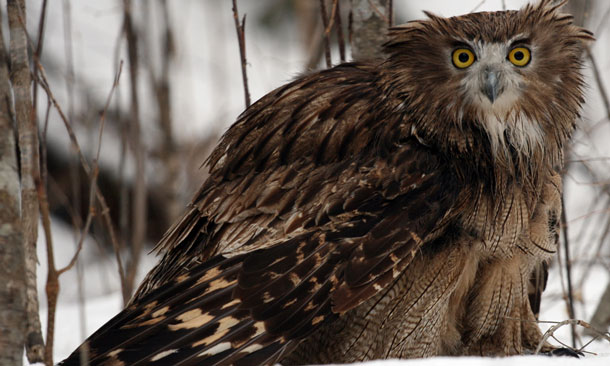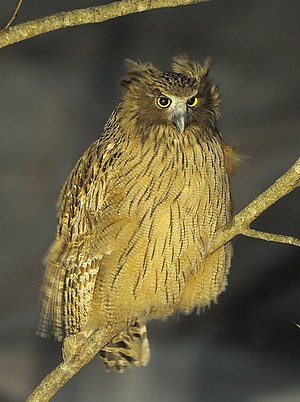
Survival of Giant Owls Studied
NEW YORK — Giant owls need giant trees to live healthy. That is the findings of a study spearheaded by the Wildlife Conservation Society and the University of Minnesota. The research results show that the world’s largest owl – and one of the rarest – is also a key indicator of the health of some of the last great primary forests of Russia’s Far East.
There are implications likely for forests across Canada and other countries.

The study found that Blakiston’s fish owl relies on old-growth forests along streams for both breeding and to support healthy populations of their favorite prey: salmon. The large trees provide breeding cavities for the enormous bird, which has a two-meter (six-foot) wingspan. And when these dead, massive trees topple into adjacent streams, they disrupt water flow, forcing the gushing river around, over, and under these new obstacles. The result is stream channel complexity: a combination of deep, slow-moving backwaters and shallow, fast-moving channels that provide important microhabitats critical to salmon in different developmental stages.
The study has been published in the August issue of the journal Oryx. Authors include Jonathan Slaght of the Wildlife Conservation Society, R. J. Gutiérrez of the University of Minnesota, and Sergei Surmach of the Institute of Biology and Soils (Russian Academy of Sciences).
The authors studied the foraging and nesting characteristics of Blakiston’s fish owl in Primorye, Russia, where they looked at nesting habitat over 20,213 square kilometers (7,804 square miles). They found that large old trees and riparian old-growth forest were the primary distinguishing characteristics of both nest and foraging sites.
Management of Old Growth Forests Essential
The authors say that management and conservation of old-growth forests is essential for sustaining this species because they are central to the owls’ nesting and foraging behavior. Moreover, conservation of Primorye’s forests and rivers sustains habitat for many other species: including eight salmon and trout species that spawn there; some of the 12 other owl species found in Primorye; and mammals like the endangered Amur (or Siberian) tiger, Asiatic black bear, and wild boar. Listed as Endangered by IUCN, Blakiston’s fish owl is restricted to riparian areas in Russia, China, Japan and possibly North Korea.
“Blakiston’s fish owl is a clear indicator of the health of the forests, rivers, and salmon populations,” said lead author Jonathan Slaght of the Wildlife Conservation Society. “Retention of habitat for fish owls will also maintain habitat for many other species associated with riparian old-growth forests in the Russian Far East.”
Logistical and financial support for this study was provided by the Amur-Ussuri Centre for Avian Diversity, with additional funding from the Bell Museum of Natural History, Columbus Zoo Conservation Fund, Denver Zoological Foundation, Disney Worldwide Conservation Fund, Minnesota Zoo Foundation, National Aviary, National Birds of Prey Trust, United States Forest Service-International Programs, and the University of Minnesota.
The Wildlife Conservation Society saves wildlife and wild places worldwide. We do so through science, global conservation, education and the management of the world’s largest system of urban wildlife parks, led by the flagship Bronx Zoo. Together these activities change attitudes towards nature and help people imagine wildlife and humans living in harmony.
WCS is committed to this mission because it is essential to the integrity of life on Earth.
Visit www.wcs.org.








